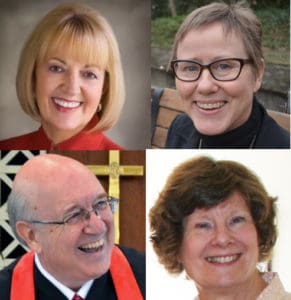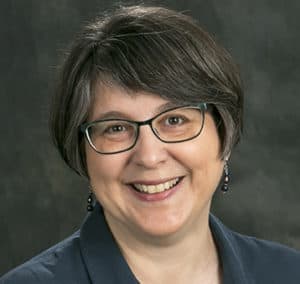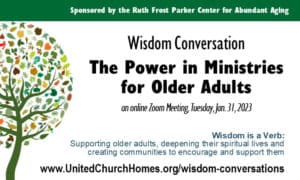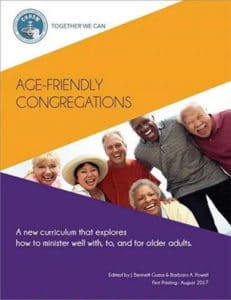Parker Center ‘Wisdom Conversations’ — Springboard to Older Adult Ministries Network

Kicking aside the cultural trappings of ageism, “Wisdom Conversations 2023: The Power in Ministries for Older Adults” kicked off the new year with a look at various approaches local congregations can explore in developing vital ministries for and with elder adults. The panel discussion sponsored by the Ruth Frost Parker Center for Abundant Aging at United Church Homes (UCH) took place Jan. 31, 2023, via Zoom.
Originally conceived of as an annual event to provide information and education for clergy and lay leaders around aging, the event has transformed into a resource for congregations on how to minister with older adults in the 21st century. The need is especially relevant given life expectancy increasing by some 20 years since 1960 and the number of Baby Boomers reaching their third chapter of living.
“Individuals today who are not having to work for health insurance anymore — maybe working part-time or volunteering with organizations in their community — want different things in their later decades of life than their parents or grandparents wanted,” said the Rev. Beth Long-Higgins, UCH’s vice president of engagement and director of the Parker Center. “I think the church has been a bit slow in learning about these spiritual needs in later life. So we decided to host a network of people who can connect online to share resources and engage in conversations on a regular basis to talk about specific ideas or topics they are seeing in their own contexts.”
Combatting Ageism
“Don’t become so well adjusted to your culture that you fit into it without even thinking,” Moderator Long-Higgins told participants at the beginning of the discussion. “We have to peel back the layers of what we’ve been taught about how people should act.”

Ageism, said Long-Higgins — how we think, act, and feel about individuals based on how old we think they are — needs challenging. Even internally, she added, older adults are affected by it. She asked attendees to think about the phrase, “Oh, I’m having a senior moment!”
“Do you say that without even thinking?” she asked. “We’ve all become accustomed to what the culture tells us,” what society tells us. However, she added, quoting The Message, “Fix your attention on God and God will transform you. God brings the best out of you.”
Panelists from Across Older Adult Ministries
The panel was comprised of four experts in Older Adult Ministries, all of whom found their call via different paths: Beth Truett, president, Aging with Grace, Inc.; Elizabeth Boyd, director of congregational resources, Seabury Resource for Aging; the Rev. Greg Smith, chaplain, King’s Bridge Retirement Community, and retired pastor, Scott Boulevard Baptist Church, Decatur, Ga.; and Jan Aerie, a gerontologist and family counselor who also is a consultant in ministries with older adults for UCC and Christian Church (Disciples of Christ) congregations.
The discussion opened with the idea that churches focusing only on reaching young families can make older adults feel as if they don’t matter and aren’t valued. Their ideas are rarely sought; their ideas seldom heard. The discussion centered on the idea that vital churches understand the importance of programs the help older adults deepen faith, spirituality, and wholeness, as well as opportunities to serve and lead.
Truett opened by discussing the life events that led her to the path of working for and with older adults. “I grew up without biological grandparents,” she said, but in her parents’ church, “formed relationships with older women.” These women fed her and fed her call to serve older adults. In 2001, she followed that call to seminary in order “to find a new place to stand in the world. If you only will listen, your call will find you.”
She remarked that ageism is the “last acceptable prejudice” in America, contributing to elder isolation and loneliness as older adults across income brackets struggle to bring meaning into their lives in a society that often forgets about them. Churches can be the place to renew the spirit and vitality of older adults. “As churches, we open our doors to the broader community,” she said, and “minister not only to our own members.”
Societal Values Vs. Individuals Theme Repeated

Elizabeth Boyd followed Truett, once again noting the battle older adults wage against being devalued, even within themselves. She told of the “Seabury Celebration of Service,” held annually at Washington National Cathedral each spring. The event invites UCC and Episcopal congregations to nominate an older person from their congregations to be recognized for their service to church and community.
“Often the honorees say, ‘Oh, I don’t know why I’m being honored. I haven’t done much,’” Boyd said, but their bios tell a different story.
Boyd talked about Seabury’s efforts to turn ageism in the church — “Get out of the way, be quiet, don’t speak up” — on its head.
She noted two Seabury offerings:
- “The Path Ahead: Spirituality & Purpose in Later Life,” a six-session training opportunity for co-facilitation and small groups available to churches. The six-week course examines ageism, spiritual needs, gratitude and resilience, and discerning the path ahead. It’s designed to give older adults a space and structure for discussing spiritual questions that don’t come up during worship, she added, noting that “they don’t usually have the opportunity to discuss these things in a supportive environment with their peers.”
- “Common Threads,” a four-part intergenerational worship series featuring four original liturgies. The model is station-based worship with people moving about within an open worship space. Participants consider scripture through music, art, and storytelling. Each service ends with communion.
Speaking from Experience
Panelist Smith’s story began with an ending that led to a rebirth. He told the story of the closing of the church building where he pastored as the congregation decided to lease space in another congregation’s building. His congregation has decided to focus on caring for the older adults in their congregation who were isolated or homebound. That focus actually gained the church new members in its new leased space. “The spirit and energy of the church began to revitalize,” he said. “We stopped being a desperate and depressed church and started being a serving church — serving other people.” The congregation realized it could still serve God and others.
“Our church ‘died’ but experienced a resurrection as a new thing,” he said.
The congregation ended up merging with its host congregation. “We now have a seed of older adult ministry,” he added. “We are going to take that and pant it in a larger field and allow it to produce far more in this larger field.”
Taking Our Cues from Trees
Aerie, the final panelist, said she found her calling thanks to two favorite babysitters she had while growing up, both widowed, but with a focus and spirit that showed. She structured her presentation around three church members who made vital contributions to their congregations, thanks to their willingness — and their congregation’s willingness — to be open to the gifts of older or disabled adults. In each case, not only were the individuals helped by their congregations: they also became integral parts of their congregation and community, and were recognized as valuable members whose gifts and identities are valued.
Woven throughout Aerie’s presentation was the theme of trees and forests. “Trees teach us. Trees are fundamentally in cohesion with each other — they collaborate, they do not compete — to nourish and ensure that all around them flourishes,” she said. “This is what we are trying to do in churches. Wisdom can only be found in the necessity of community.”
Aerie noted that the forest serves as a sanctuary “that works collaboratively and on many levels to help trees flourish and thrive.” Extrapolating to humans, she said, “Through sanctuary living, and how trees heal each other, we can learn so much. Hope is everything.”
The Key is Working Together
Long-Higgins wrapped up the discussion, noting that “aging is not a solo sport. We all need people around us.”

The Wisdom Conversations will continue on a quarterly basis, with one-hour zoom sessions to give time for participants to share stories and interact with each other, and build an Abundant Aging Network for Older Adult Ministries of support and resources. One such resource is Age-Friendly Congregations, produced by CHHSM with chapters by Long-Higgins and Aerie.
“We hope the Abundant Aging Network for Older Adult Ministries will provide opportunities for sharing of ideas and the expansion of ministries meeting the spiritual needs of those who already are in our congregations,” Long-Higgins added, “and of those who would love to be connected to the ministry and mission of congregations in their neighborhood.”
The next quarterly discussion takes place May 30 at 3 p.m. Learn more at abundantaging.org.
Join Our Mailing LIst
"*" indicates required fields
